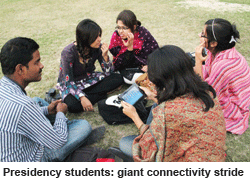 A two-month-long daily agitation begun on August 21 by students of Kolkata’s top-ranked Presidency University (PU, estb. July, 2010) shows no signs of ending. Students are on the warpath because PU’s best teachers are being transferred to government colleges, and also because the varsity’s administration steadfastly refuses to reveal the investigation status of a mob attack on the campus on April 10, 2013. Alleging that the PU management is complicit in the steady whittling down of the varsity’s autonomy, the Presidency University Students’ Union Council (PUSUC) is pressing for the resignation of vice chancellor Dr. Anuradha Lohia, herself a PU alumna.
A two-month-long daily agitation begun on August 21 by students of Kolkata’s top-ranked Presidency University (PU, estb. July, 2010) shows no signs of ending. Students are on the warpath because PU’s best teachers are being transferred to government colleges, and also because the varsity’s administration steadfastly refuses to reveal the investigation status of a mob attack on the campus on April 10, 2013. Alleging that the PU management is complicit in the steady whittling down of the varsity’s autonomy, the Presidency University Students’ Union Council (PUSUC) is pressing for the resignation of vice chancellor Dr. Anuradha Lohia, herself a PU alumna.
Matters took a turn for worse last month when students were assaulted by policemen during a visit by chief minister Mamata Banerjee to the university’s campus to attend PU’s convocation on August 21. Following a police lathi charge students gheraoed the VC for 26 hours in her office. “We have demanded a statement from the administration condemning the police attack on students on August 21,” says Souvik Sarkar, joint secretary of Students’ Federation of India (SFI) and class representative of PUSUC.
To gauge whether PUSUC has the support of students, the union conducted a two-day referendum on September 15 and 16. About 85 percent of the university’s students expressed opinions on whether the VC has failed to pay adequate attention to the views of the student community; whether the transfer of teachers from PU has affected the quality of teaching; whether the autonomy of PU is being eroded and whether a recent students admission test had been conducted fairly. A majority of students supported the union’s misgivings. “The result (of the referendum) lends strength to our demands. We have intimated the outcome of the referendum to the state’s governor and ex officio chancellor of PU. After getting a response from the governor’s office, we will disclose our next course of action,” says Trisha Chanda, general secretary of PUSUC.
A particularly sore point with PU’s agitated students is the sudden and arbitrary transfers of faculty from PU to government colleges. According to a PUSUC spokesperson, five-seven popular professors have either been transferred or have resigned during the past year. “The board of governors of the university is the highest decision-making body which should determine appointments and transfers. But transfers of PU faculty to other government colleges and universities are being made by higher education officials of the state government. This is proof that the autonomy of the institution is being steadily eroded,” adds Chanda.
However Dr. Lohia doesn’t see much merit in the students’ charges. “We have complete academic freedom to teach the courses we wish. On the issue of transfer of faculty, if the government transfers a teacher I have no choice but to agree to the government’s request,” she says.
In this hostile and antagonistic scenario, even a grant of Rs.118 crore announced by the chief minister for Presidency University’s new campus in New Town and “for the repair, renovation, and beautification of this existing heritage campus for the approaching bicentenary celebrations”, as also for establishing a Himalayan Centre of Presidency University at Dow Hill, Kurseong in Darjeeling district, is being viewed with suspicion. “Funding universities is the State’s duty. There’s no need for the vice chancellor to be so obsequious before the chief minister and state government,” says a student activist who prefers to be anonymous.
But Dr. Buroshiva Dasgupta, a PU alum and former director of the Manipal Institute of Communications and now the director of NSHM Institute of Media and Design, Kolkata, believes that students’ apprehensions relating to erosion of PU’s autonomy are not unwarranted. “The education system in the state has experienced decay due to continuous, well-designed political interference during 34 years of rule of the CPM-led Left Front government. Unfortunately the Trinamool Congress government which was elected in 2011, is continuing this tradition. It’s high time students and faculty and higher education institutions stood up to political interference in academia,” says Dasgupta.
The prolonged students’ agitation in PU is perhaps a sign that the process has begun.
Bappaditya Chatterjee (Kolkata)